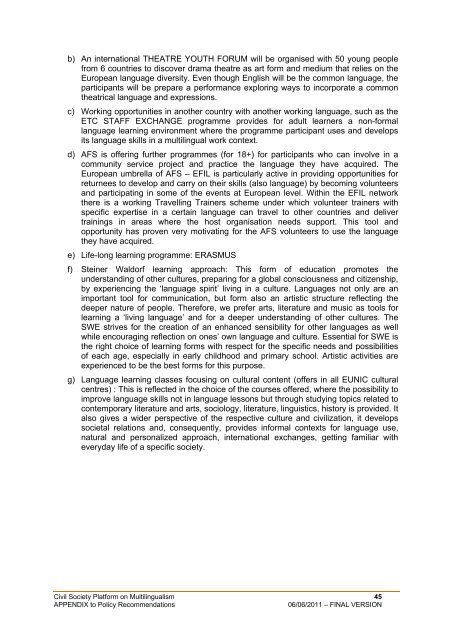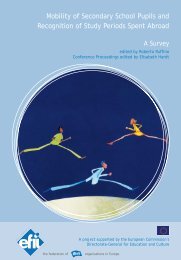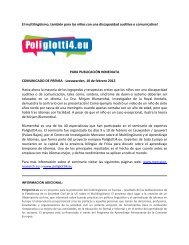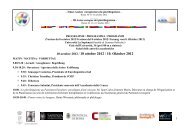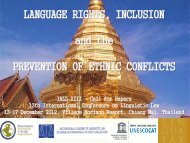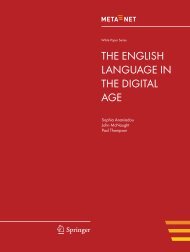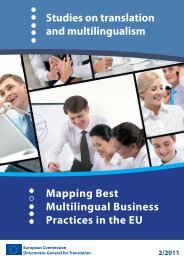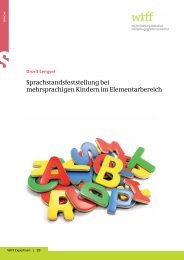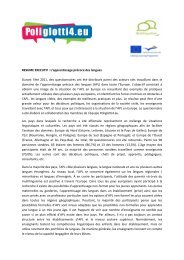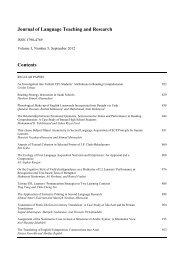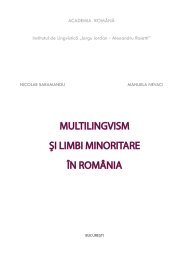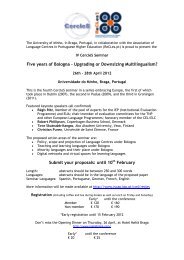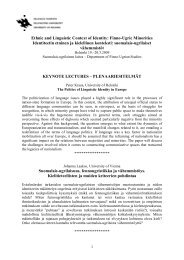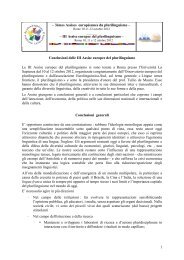FULL VERSION - European Commission - Europa
FULL VERSION - European Commission - Europa
FULL VERSION - European Commission - Europa
You also want an ePaper? Increase the reach of your titles
YUMPU automatically turns print PDFs into web optimized ePapers that Google loves.
) An international THEATRE YOUTH FORUM will be organised with 50 young peoplefrom 6 countries to discover drama theatre as art form and medium that relies on the<strong>European</strong> language diversity. Even though English will be the common language, theparticipants will be prepare a performance exploring ways to incorporate a commontheatrical language and expressions.c) Working opportunities in another country with another working language, such as theETC STAFF EXCHANGE programme provides for adult learners a non-formallanguage learning environment where the programme participant uses and developsits language skills in a multilingual work context.d) AFS is offering further programmes (for 18+) for participants who can involve in acommunity service project and practice the language they have acquired. The<strong>European</strong> umbrella of AFS – EFIL is particularly active in providing opportunities forreturnees to develop and carry on their skills (also language) by becoming volunteersand participating in some of the events at <strong>European</strong> level. Within the EFIL networkthere is a working Travelling Trainers scheme under which volunteer trainers withspecific expertise in a certain language can travel to other countries and delivertrainings in areas where the host organisation needs support. This tool andopportunity has proven very motivating for the AFS volunteers to use the languagethey have acquired.e) Life-long learning programme: ERASMUSf) Steiner Waldorf learning approach: This form of education promotes theunderstanding of other cultures, preparing for a global consciousness and citizenship,by experiencing the ‘language spirit’ living in a culture. Languages not only are animportant tool for communication, but form also an artistic structure reflecting thedeeper nature of people. Therefore, we prefer arts, literature and music as tools forlearning a ‘living language’ and for a deeper understanding of other cultures. TheSWE strives for the creation of an enhanced sensibility for other languages as wellwhile encouraging reflection on ones’ own language and culture. Essential for SWE isthe right choice of learning forms with respect for the specific needs and possibilitiesof each age, especially in early childhood and primary school. Artistic activities areexperienced to be the best forms for this purpose.g) Language learning classes focusing on cultural content (offers in all EUNIC culturalcentres) : This is reflected in the choice of the courses offered, where the possibility toimprove language skills not in language lessons but through studying topics related tocontemporary literature and arts, sociology, literature, linguistics, history is provided. Italso gives a wider perspective of the respective culture and civilization, it developssocietal relations and, consequently, provides informal contexts for language use,natural and personalized approach, international exchanges, getting familiar witheveryday life of a specific society.Civil Society Platform on Multilingualism 45APPENDIX to Policy Recommendations06/06/2011 – FINAL <strong>VERSION</strong>


